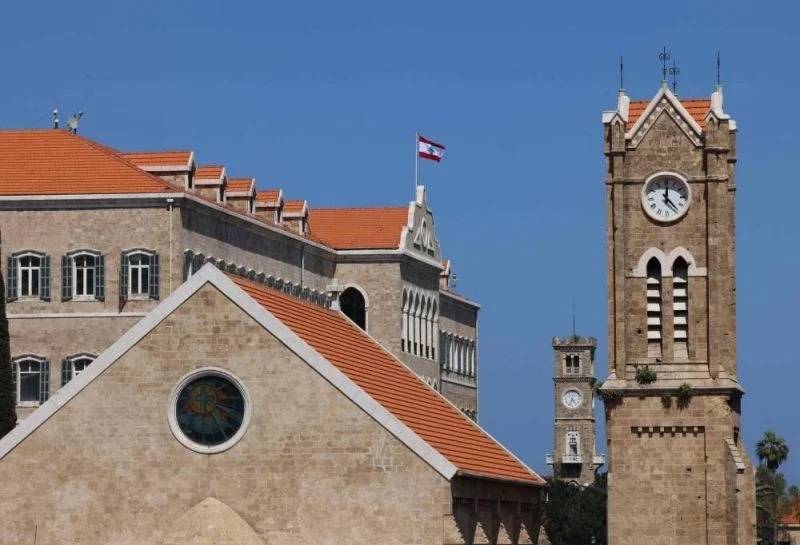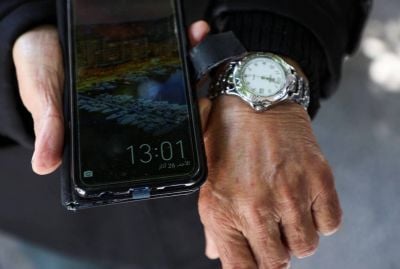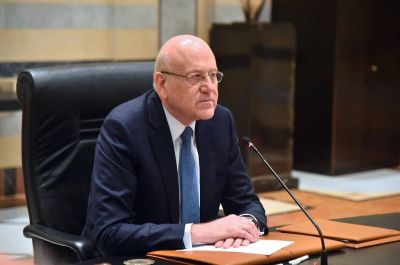
The clocks of the Saint-Louis des Capuchins church and the Grand Serail display different times. (Credit: Joseph Eid/AFP)
Initially, there were no indications of any sectarian unrest, but caretaker Prime Minister Najib Mikati’s decision to postpone the switch to daylight saving time quickly escalated into a sectarian issue, laying bare the growing political anxieties among Christians.
The decision to postpone by one month the change to summer time, made at the last minute by the Sunni leader, was intended to assist Muslims in their fasting during Ramadan.
However, some Christians felt that this was the final insult in a situation in which they already feel sidelined and that “their” Lebanon is gradually disappearing. This sentiment was echoed by Bkirki, the seat of the Maronite Church, and major political parties.
This dynamic has been accelerating since 2019 and has intensified in light of the fact that the Maronite community’s highest post, the presidency, has been vacant for nearly five months.
“Christians are anxious about the future of their community, particularly as they are more likely to leave the country and feel that they no longer have a genuine stake in it,” says Albert Kostanian, president of the think tank Kulluna Irada.
All communities in Lebanon are apprehensive, fearing minority status. However, in recent years, the Christian community’s concerns have been exacerbated by several factors, including the disintegration of the Lebanese state and economy.
This is especially true because this community has traditionally held a central position in the justice, education and banking sectors, all of which are now in ruins.
Moreover, the August 2020 Beirut port explosion, which devastated large swathes of predominantly Christian areas in the capital’s east, has only compounded the issue.
‘We stopped counting’
The Christian community, which played a significant role in the formation of Greater Lebanon, now appears to be apprehensive about the prospect of becoming a minority.
The community is particularly concerned that its minority status (in the last election, 34 percent of voters were Christian), not to mention the presence of numerous predominantly Muslim refugees, may be used to challenge its political influence.
The current political and religious equilibrium grants the Christian community half of the country’s parliamentary seats, the presidency and many highly esteemed positions at the top of the government.
“They are very well represented in the Lebanese state,” says Kostanian.
Although no one openly questions the distribution of religious groups in Lebanon, Mikati broke a taboo when he addressed the Christian presence in a television interview in February.
During the interview, he mentioned a mysterious study that had reportedly reached the Maronite patriarch, estimating that Christians represented only 19.4 percent of the population. The caretaker premier’s remarks caused an uproar.
Razi Al Hajj, a Lebanese Forces (LF) MP from Metn, echoed the slogan of assassinated Prime Minister Rafik Hariri, saying “we stopped counting,” since the Taif agreement, which enshrines Islamic-Christian parity.
“I don't understand why we are talking about this,” he added.
‘Without a Christian partner’
The current political context has amplified unease among the Christian community in Lebanon. With no president in power, the country is de facto governed by Mikati and powerful Shiite Parliament Speaker Nabih Berri.
Despite opposition and a boycott by most Christian parties, the head of government has, since the onset of the presidential vacuum, convened the cabinet on multiple occasions at Berri’s impetus.
The Christian parties however are firm in their assertion that a cabinet meeting during the presidential vacuum should only be held in cases of extreme emergency, which was one of the reasons the community’s representatives protested the decision to delay the switch to daylight saving time.
Former MP for the Free Patriotic Movement (FPM) in Metn, Edgar Maalouf, criticized the decision, stating: “Nabih Berri and Najib Mikati met over coffee and decided to change the time of the whole country on a whim.”
“This exemplifies how they have been governing with a free hand since the end of President Michel Aoun’s mandate on Oct. 31, without a Christian partner,” he added.
To make matters worse for the Maronite parties, the Shiite parties Amal and Hezbollah are trying to impose their candidate for the presidency, Zgharta’s political heavyweight, Sleiman Frangieh, who does not hold the support of any major Christian bloc.
The tense political context in Lebanon is giving rise to populist speeches and federalist ideas that are presented as solutions to the country’s problems, particularly those faced by the Christian community.
Some even believe that Lebanon should be divided into four geographically noncontiguous cantons, one for each denomination.
“Thanks to Mikati and Berri, federalism feels imminent,” said Alfred Riachi on Twitter.
Riachi is a pro-federalist figure and was a candidate in the 2022 parliamentary elections, but only won 0.1 percent of the vote in Metn.
He also shared a map of Lebanon showing different time zones for various areas, which made the rounds on social media.
However, the idea has been rejected by the main Christian parties and carries no electoral weight for the time being.
“Federalism won’t solve our problems, we need a decentralized system,” says Maalouf. He is joined by Hajj, who believes that the real problem is neither religious nor cultural.
According to Hajj, the current divide in Lebanon is not between Muslims and Christians, but rather between those who want a state that represents all denominations and those who do not, some of whom are Christians.
Kostanian shares this view and believes that the Lebanese people must first agree on the issues that divide them.
“The first thing to do is to build a state, which must manage central policies such as foreign affairs or currency, which are currently the subject of disagreement … Although federalism may be adapted to the governance of plural societies, it cannot solve these problems,” he says.
So why did the issue take on a sectarian dimension?
“Awakening sectarian instincts is the best way for politicians to redirect popular attention away from important issues," says Karim Bitar, a political scientist and Saint Joseph University professor.
Berri and Mikati may have their own motives for manipulating public opinion, but FPM leader Gebran Bassil also capitalized on the controversy. By positioning himself as an outsider to the traditional political class, he is hoping to restore his image among the Christian electorate after his falling out with his main ally, Hezbollah.
Bassil’s use of confessional rhetoric contributed to pressuring Mikati into reconsidering his daylight saving time decision and could potentially block Frangieh’s path to Baabda as well.
This article was originally published in French in L'Orient-Le Jour. Translation by Sahar Ghoussoub.

